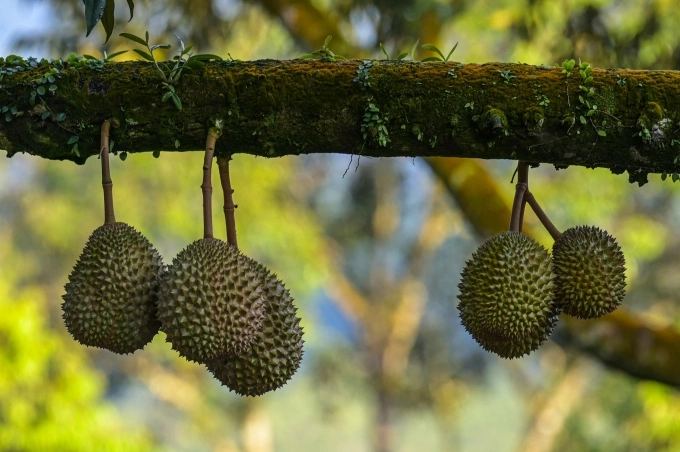The trees, ranging from three to 40 years old, were cut down during an ongoing operation aimed at tackling land encroachment in the Gunung Benum Forest Reserve in Raub district.
Zainuddin Jamaluddin, director of the state’s Forestry Department, said the operation spans about 250 hectares and is expected to last two months.
“Besides Musang King, D24, IOI and kampung variety durian trees, the enforcement team also cut down rambutan, mangosteen, petai and several other fruit trees planted within the forest reserve,” the New Straits Times quoted him as saying on Thursday.
 |
|
This picture taken on Feb. 8, 2021, shows durians hanging on a tree at a farm in Raub in Malaysia’s Pahang state. Photo by AFP |
The crackdown started on July 21 following a decree from Pahang’s Sultan Abdullah Ahmad Shah, who called for swift action to stop illegal land occupation across the state.
Zainuddin had previously said that the area has become known for unlawful fruit tree planting, with local residents believed to be responsible.
Last week, authorities intercepted a farmer transporting 919 kilograms of durians, valued at approximately RM5,000 (US$1,180), grown illegally in the reserve, The Star reported.
Raub, known as Malaysia’s durian capital and dubbed “Musang King Durian Town,” boasts around 150,000 durian trees sprawling across 2,000 hectares of state land. However, it has recently made headlines due to illegal durian farms.
Earlier this year, state authorities carried out a month-long operation to shut down these orchards that resulted in the destruction of over 1,000 durian trees, sparking backlash from the unlicensed farmers and Raub’s Member of Parliament Chow Yu Hui, according to local media.
In early May, the Pahang Sultan learned that a staggering 10,521 hectares of land in Raub had been unlawfully occupied and personally visited one of the former illegal orchards.
While the previous operation faced resistance, Zainuddin said that since the latest crackdown began, there have been no reported objections or threats from the farmers or planters involved.
“The farmers have complied with the department’s firm action to destroy the trees illegally grown on encroached land,” he noted.
The land encroachment problem in Pahang is not limited to Raub. In April, the Sultan revealed that nearly 14,500 hectares of government land had been unlawfully occupied, with crops such as oil palm, rubber, and durian being cultivated on these areas.
He noted that nearly 6,000 hectares of permanent forest reserves have been encroached upon, calling it a blatant theft of public resources, as cited by the Malay Mail.
“I will speak out when there is encroachment, not only in Raub and Cameron Highlands but also in all districts in Pahang,” he said in an interview with national news agency Bernama last week.
He also urged residents to report any information to the authorities to aid in monitoring the situation.
Durian has been playing an increasingly large role in Malaysia’s economy, drawing in tourists and boosting foreign trade. When Tourism Malaysia launched its summer Durian Tourism Packages 2024/2025 last year, it expected them to rake in RM2 million in sales for those two years.
Revenues from similar packages had jumped from RM107,000 in 2022 to RM1.6 million in 2023, according to Khairul Firdaus Akbar Khan, Malaysia’s Deputy Minister of Tourism, Arts and Culture.
Exports of the fruit, meanwhile, have surged by more than 250%, rising from RM321.2 million (US$194 million) in 2018 to RM1.14 billion in 2022.
The country secured a deal last year to export fresh durians to China, which had previously only accepted frozen ones. Its Ministry of Agriculture and Food Security expects shipments to rise to RM1.5 billion this year.




